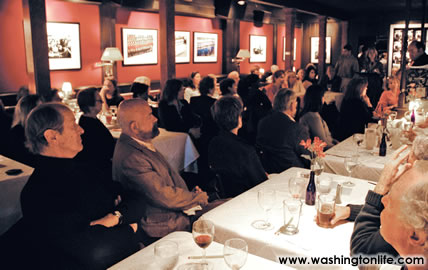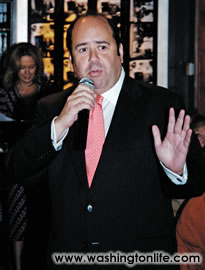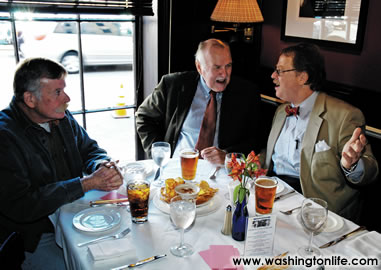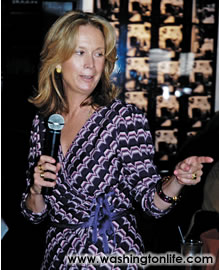Leak ThroatAt Nathans’ community lunch, MATT COOPER discusses Plamegate
|
||||||||||||||||
 |
 |
|
SOLD-OUT Q&A CAFÉ AT NATHANS |
MATT COOPER |
CJ: When was the last time you had to testify?
MC: I only testified that one time before the
grand jury, a year before I gave a deposition
about Scooter Libby.
CJ: Was this the first time that you’ve ever been
involved in something like this?
MC: I’ve had traffic tickets and very extensive
library fines. I’m a nice boy, really.
CJ: Without giving anything away, walk us
through the experience of going before a grand
jury.
MC: Like many things in life, it’s a little anticlimactic.
You get in there and the grand jury
looks like a shabby classroom. The grand jurors,
about twenty of them, sit at small desks that are
stacked up in rows at an angle. They were predominately
African-American, mostly women,
and they seem quite engaged. The prosecutor
interviews you and has an overhead projector
which he [uses] and points to some quotations.
It was very tedious as he went through every
excruciating detail in my case about my very brief phone call with Karl Rove. If you’ve ever
seen Law and Order, you know the old adage
that a jury will indict a ham sandwich. We
usually think they are passive, they’re asleep and
will do whatever the prosecutor says. The thing
that struck me was that this grand jury was
quite engaged, I would say they asked about a
third of the questions.
CJ: A lot of people ask this question: what about
Robert Novak? It all started with him. Are we to
assume that he went into that same room, said
what he had to say and then went to ground?
MC: It’s been one of the great mysteries of this
case because of course he was the one [who]
outed Valerie Plame, revealing her identity in
that July 14, 2003 column. For a long time
people wondered about Novak because unlike
the other reporters who have testified in the
case, Tim Russert, myself, Judith Miller, the
two reporters from The Washington Post, Novak
would never say if he’s testified or not. At this
point, I don’t think there’s any other plausible
explanation other than he did testify. The only
question that remains is if he did so with the
acquiescence of his confidential sources or if he
testified without their consent.
 |
 |
CAROL JOYNT |
CJ: Have you talked to him?
MC: I’ve run into him, but we really haven’t
chatted.
CJ: Go back to your experiences at Time
magazine with Mr. Pearlstine, who is your editorin-
chief. He said that your notes would be made
available. Was that in consultation with you?
MC: Yes, it was. We had determined that my
notes were really the property of Time magazine
because I had taken them on a company
computer, which is clearly the property of the
company and that Time magazine was a party
[to] this case… After we fought this thing all the
way to the Supreme Court, the Supreme Court
decided not to take the case and then comes
judgment day, July 29, 2005 and the judge said
Time had to comply. Norman Pearlstine had to
make a decision about whether or not to turn
over my notes and the emails I had written. We
had made the decision that we wouldn’t and
would keep fighting. Finally, he made a difficult
and different decision, one that I respect, which
was to comply with the Supreme Court of the
United States and turn over my notes. Many
people in journalism screamed and yelled about
it [but] I think it was a principled decision. It’s
one that, at the time, I disagreed with, but he
did consult with me. I think he made a hard
choice, on balance I think that he would have
been better off fighting longer.
CJ: Was the decision you made in concert with his?
MC: I faced a very interesting position after my
notes were turned over by Time Inc. because it
leaked out this now famous email that I wrote
to my bosses about my conversation with Karl
Rove on “double super secret background.”
One of the funniest things about this was to
watch the journalistic elite, the political analysts,
and all the cable show pundits analyze
what I meant by double super secret background.
They would say, “Cooper’s statements
were on double super secret background,” as
if this were a widely acknowledged journalistic
term. Those of you who have seen Animal
House know if [refers] to John Belushi’s fraternity
hoiuse being put on probation. If anything
is a lesson, your emails are not safe. So
they turned over my email, and my source was
known, and a lot of people said to me now that
my source is known, what’s left to protect, why
don’t you just go testify? Even though Time had
complied, I didn’t think I could just go ahead
without the source giving me his acquiescence.
On the very day that I was supposed to, Karl
Rove through his attorney and my attorney, did
give me that permission to go testify.
CJ: What is your relationship with Karl Rove?
MC: It’s a little closer than my relationship with
Nicole Kidman. At the time I just started covering
the White House, so I didn’t have a relationship
with him. In the intervening time I’ve
spoken with him, but no special relationship.
CJ: When was the last time you talked with him?
MC: It was before my testimony. I did speak
during the time after Scott Mclellan said it was ludicrous to think Karl Rove was involved.
CJ: There is a lot of shout and frown going on
around the city right now about Judith Miller.
What has it been like for you when there were
originally reports the two of you would go to jail,
then it was only Judy going to jail, then there
were reports she had a $1.2 million book contract,
and then the next thing you know, Judy is getting
eaten alive by everyone.
MC: It’s the strangest thing. I’ve never seen
anything like it. I wasn’t surprised when she
went off to jail. I think she made a number
of defiant statements. We talked a lot together
because our court cases starting in October
2004 were joined. I talked to her from timeto-
time. I visited her in jail. I am sorry she had
the misfortune of being there. This is not a
pretty place, and this is not a minimal security
place. It’s very, very grim over there. I can’t
explain what’s happened in the weeks since
she’s gotten out.
CJ: Do you think her going to jail made any
difference?
MC: This whole case has raised an interesting
question for the press about the use and
misuse of anonymous sources. When do we go
off the record with somebody and how do we
handle it? If you do have a conversation with
some degree of anonymity that’s really a form
of binding contract not only between you and
your sources but also your corporation and the
source. I hope that if any good comes out of
this, it will be the passage of a national shield
law. In most states, in 49 states, there is some
protection for journalists and their confidential
sources giving journalists privileges similar to
the relationship between doctor/patient, priest/
parishioner, and lawyer/client. Basically all the
states have decided to give journalists this type
of protection because that this is the type of
confidential relationship we want to preserve.
What I so painfully discovered is that this does
not exist at the Federal level. Now there is a bipartisan
effort in Congress to create this law.
CJ: When did you find out that you were a part
of this criminal investigation?
MC: It’s so much less interesting in real life, I
got a call from the FBI one day, they wanted
to talk to me, I refused and I talked
to Time Inc.’s counsel about it.
Later they eventually sent a subpoena,
which went by fax to my
lawyers. I’ve had a number of the
best lawyers in the country, Floyd
Abrams, the famous first amendment
lawyer, as well as Ted Olson,
who did my appeal to the Supreme
Court along with Miguel Estrada
who was appointed and ultimately
not appointed to the court. So it has
been an interesting group.
CJ: How many lawyers do you have
working on this case right now?
MC: No, it’s not like Michael Jackson.
For a while there were a fair number
between the Time lawyers, and I have
been greatly helped by my friend
and local attorney, Richard Sauber, a
partner at Fried Frank, who was my
personal attorney throughout this whole thing.
Now it’s just down to him.
CJ: What’s the mood like at the White House?
MC: I think it’s like the rest of Washington.
There is an enormous sort of buzz in the
anticipation of what is going to happen. You
do sense more tension. It’s very distracting and
very consuming. It’s also the elephant in the
room nobody wants to talk about since that
could lead to more subpoenas, and even though
it’s topic number one, people are not actually
talking about it.
CJ: Have you had eye contact with the President
since all this transpired?
MC: I don’t think I have since I testified. In
December 2004, while I was in the midst of
testifying for this whole thing, I went with a
couple of colleagues of mine to interview the
President because he was Time’s person of
the year. The first words he said to me were,
“Cooper, I thought you would be in jail by
now,” which I took in good natured spirit.
CJ: Have you met Joe Wilson and Valerie Plame?
MC: After I was subpoenaed, I ran into them
at a party. I run into them periodically. He’s a
colorful guy. I know there’s some controversy
about some of the things he said. The underlying
thing is that the CIA said that a crime
has been committed, which led to an FBI
investigation.
CJ: Who would be your pick to play you in the
movie?
MC: George Clooney, it’s obvious, I get it all the
time!
For a more complete schedule, please visit www.nathansgeorgetown.com
